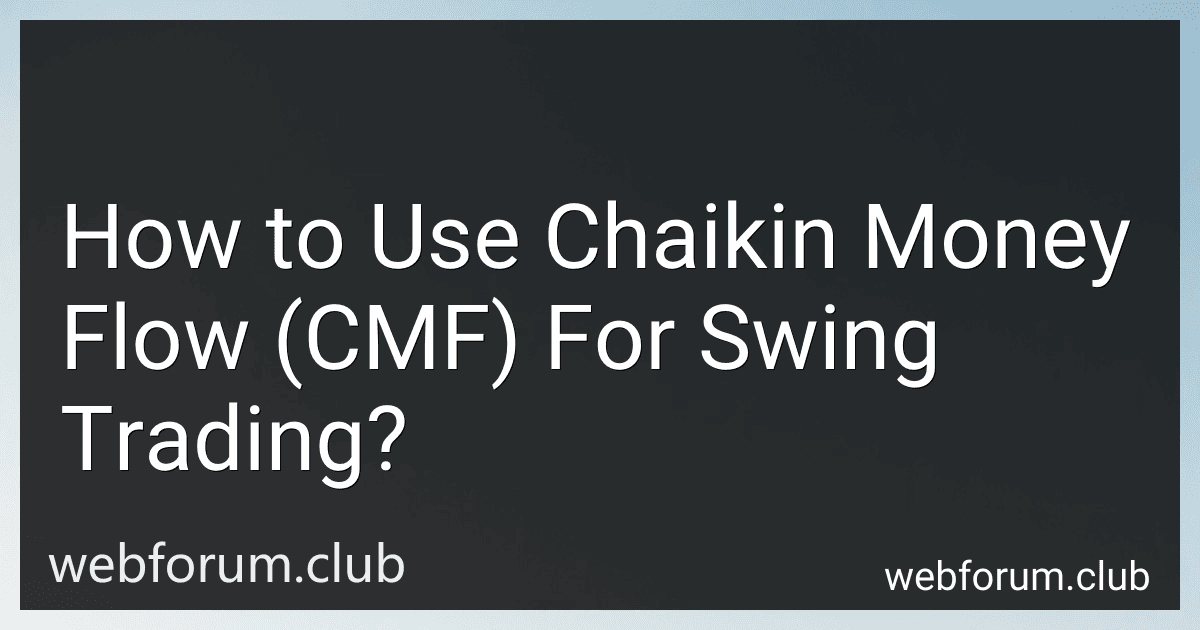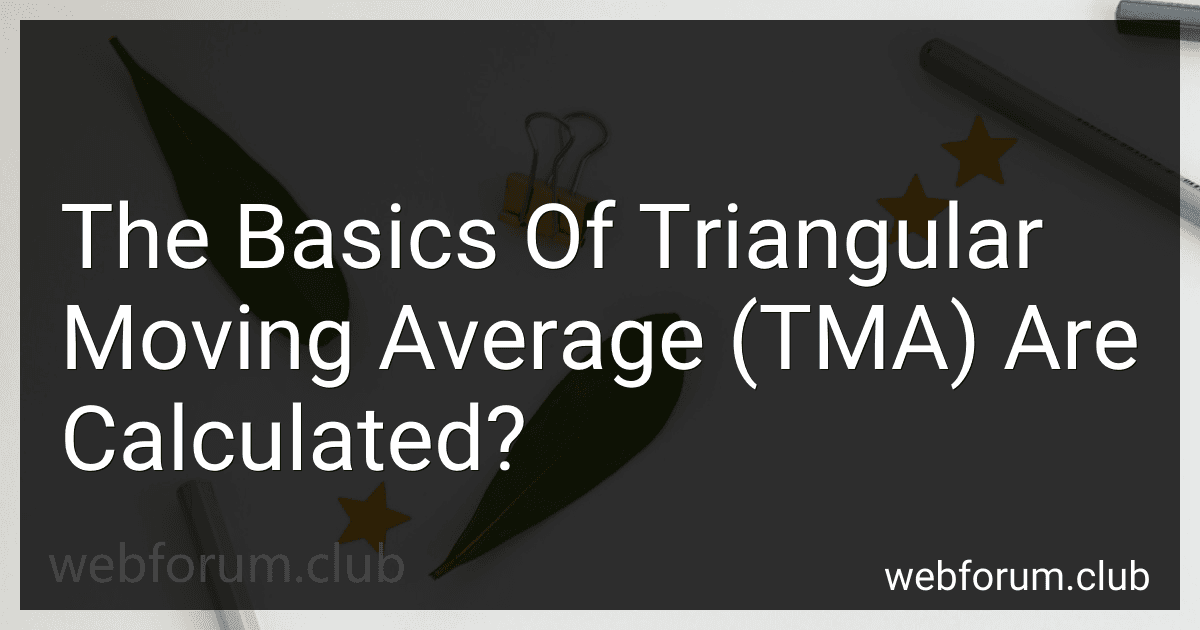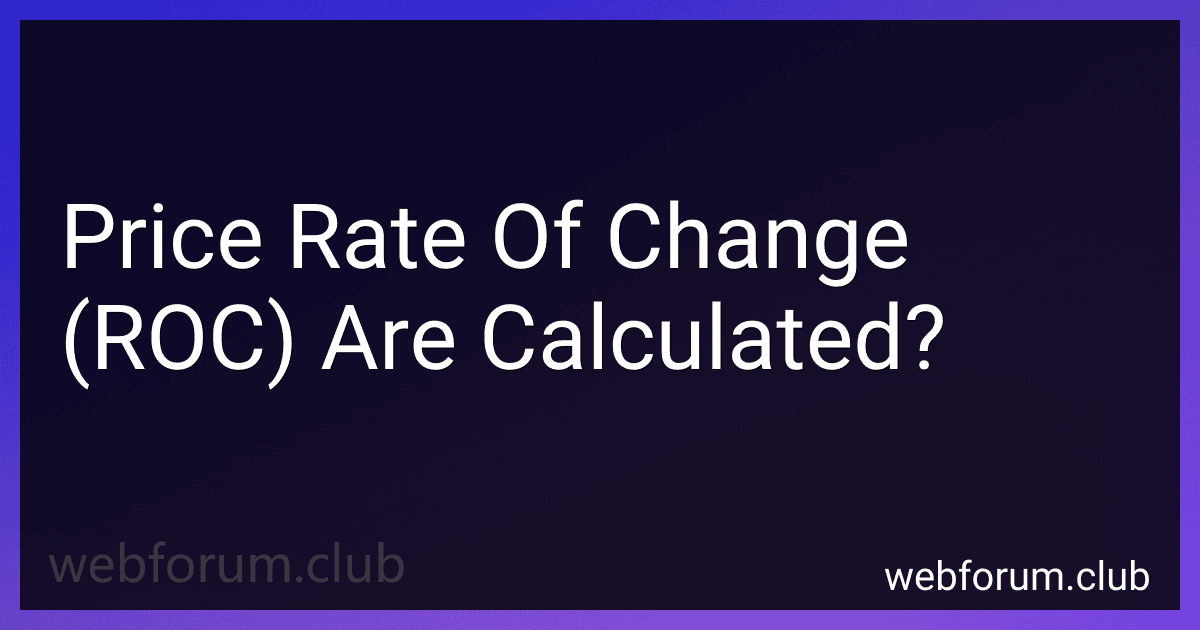WebForum
-
 9 min readChaikin Money Flow (CMF) is a popular technical indicator used by swing traders to assess buying or selling pressure in a stock or other financial instrument. It combines price and volume data to provide insights into the strength and direction of a trend. Here is an overview of how to use CMF for swing trading:Understanding CMF Calculation: CMF is calculated by taking the Accumulation/Distribution Line (ADL) and smoothing it with a moving average.
9 min readChaikin Money Flow (CMF) is a popular technical indicator used by swing traders to assess buying or selling pressure in a stock or other financial instrument. It combines price and volume data to provide insights into the strength and direction of a trend. Here is an overview of how to use CMF for swing trading:Understanding CMF Calculation: CMF is calculated by taking the Accumulation/Distribution Line (ADL) and smoothing it with a moving average.
-
 7 min readDetermining the strength of a stock market trend is crucial for investors looking to make informed decisions. Here are some factors to consider when evaluating the strength of a stock market trend:Volume: One way to assess the strength of a trend is by analyzing the trading volume associated with it. An increasing volume suggests higher investor participation, indicating a stronger trend.
7 min readDetermining the strength of a stock market trend is crucial for investors looking to make informed decisions. Here are some factors to consider when evaluating the strength of a stock market trend:Volume: One way to assess the strength of a trend is by analyzing the trading volume associated with it. An increasing volume suggests higher investor participation, indicating a stronger trend.
-
 11 min readA Complete Guide to Williams %R for scalping:Williams %R, developed by Larry Williams, is a popular technical indicator used by traders for analyzing overbought and oversold market conditions. It is specifically useful for short-term trading strategies like scalping, which involve making quick trades to capture small price movements.Williams %R is a momentum oscillator that indicates the current closing price relative to the high-low range over a specified period, usually 14 periods by default.
11 min readA Complete Guide to Williams %R for scalping:Williams %R, developed by Larry Williams, is a popular technical indicator used by traders for analyzing overbought and oversold market conditions. It is specifically useful for short-term trading strategies like scalping, which involve making quick trades to capture small price movements.Williams %R is a momentum oscillator that indicates the current closing price relative to the high-low range over a specified period, usually 14 periods by default.
-
 8 min readSure! The Triangular Moving Average (TMA) is a technical indicator used in financial markets to smoothen out price fluctuations and identify trends. The TMA is similar to other moving averages, but it provides a more accurate representation of the average price over a given period.To calculate the TMA, follow these steps:Determine the length or period over which you want to calculate the TMA. For example, if you want a 10-day TMA, you would consider the prices for the past 10 days.
8 min readSure! The Triangular Moving Average (TMA) is a technical indicator used in financial markets to smoothen out price fluctuations and identify trends. The TMA is similar to other moving averages, but it provides a more accurate representation of the average price over a given period.To calculate the TMA, follow these steps:Determine the length or period over which you want to calculate the TMA. For example, if you want a 10-day TMA, you would consider the prices for the past 10 days.
-
 10 min readRecognizing trend reversals in the stock market is a crucial skill for investors and traders. By identifying when a stock's direction is changing, one can make informed decisions regarding buying or selling positions. Here are some factors to consider when trying to recognize trend reversals:Price patterns: Analyze the price movements on the stock chart to identify potential reversal patterns, such as head and shoulders, double tops or bottoms, or trendline breaks.
10 min readRecognizing trend reversals in the stock market is a crucial skill for investors and traders. By identifying when a stock's direction is changing, one can make informed decisions regarding buying or selling positions. Here are some factors to consider when trying to recognize trend reversals:Price patterns: Analyze the price movements on the stock chart to identify potential reversal patterns, such as head and shoulders, double tops or bottoms, or trendline breaks.
-
 9 min readThe Force Index (FI) is a technical analysis tool used in trading to measure the strength of buying or selling pressure in the market. It was developed by Alexander Elder, a well-known trader and author.The Force Index is calculated using three variables: price change, trading volume, and time. It attempts to capture the force behind price movements to identify potential trading opportunities.
9 min readThe Force Index (FI) is a technical analysis tool used in trading to measure the strength of buying or selling pressure in the market. It was developed by Alexander Elder, a well-known trader and author.The Force Index is calculated using three variables: price change, trading volume, and time. It attempts to capture the force behind price movements to identify potential trading opportunities.
-
 10 min readThe Elder-Ray Index is a technical analysis tool used in trading to evaluate the strength of bulls and bears in the market. It was developed by Dr. Alexander Elder, a renowned trader and author. This index consists of two components: the Bull Power and the Bear Power.The Bull Power is calculated by subtracting the period's low price from the Exponential Moving Average (EMA) of the closing price.
10 min readThe Elder-Ray Index is a technical analysis tool used in trading to evaluate the strength of bulls and bears in the market. It was developed by Dr. Alexander Elder, a renowned trader and author. This index consists of two components: the Bull Power and the Bear Power.The Bull Power is calculated by subtracting the period's low price from the Exponential Moving Average (EMA) of the closing price.
-
 9 min readMoving averages are widely used by traders and investors to identify stock market trends. They are calculated by taking the average price of a stock over a specific time period, typically using closing prices. The moving average line is then plotted on a stock chart to give a visual representation of the stock's price movement.The primary purpose of using moving averages is to smooth out short-term price fluctuations and provide a clearer picture of the overall trend.
9 min readMoving averages are widely used by traders and investors to identify stock market trends. They are calculated by taking the average price of a stock over a specific time period, typically using closing prices. The moving average line is then plotted on a stock chart to give a visual representation of the stock's price movement.The primary purpose of using moving averages is to smooth out short-term price fluctuations and provide a clearer picture of the overall trend.
-
 8 min readThe Hull Moving Average (HMA) is a popular technical indicator used by traders to analyze price trends and identify potential entry and exit points in the financial market. Unlike traditional moving averages, the HMA applies weighted moving averages and eliminates lag as much as possible by using a square root of a weighted moving average.To calculate the Hull Moving Average, you need to follow these steps:Choose a period for the HMA, such as 20 or 50.
8 min readThe Hull Moving Average (HMA) is a popular technical indicator used by traders to analyze price trends and identify potential entry and exit points in the financial market. Unlike traditional moving averages, the HMA applies weighted moving averages and eliminates lag as much as possible by using a square root of a weighted moving average.To calculate the Hull Moving Average, you need to follow these steps:Choose a period for the HMA, such as 20 or 50.
-
 10 min readOn-Balance Volume (OBV) is a technical analysis indicator often used in financial markets to measure the strength and direction of a trend. It was developed by Joseph Granville in the 1960s.OBV calculates cumulative trading volume based on whether prices of a financial asset close higher or lower than the previous day's closing price. The premise behind OBV is that volume precedes price movements, and changes in volume can signal the strength of a trend.
10 min readOn-Balance Volume (OBV) is a technical analysis indicator often used in financial markets to measure the strength and direction of a trend. It was developed by Joseph Granville in the 1960s.OBV calculates cumulative trading volume based on whether prices of a financial asset close higher or lower than the previous day's closing price. The premise behind OBV is that volume precedes price movements, and changes in volume can signal the strength of a trend.
-
 7 min readPrice Rate of Change (ROC) is a technical indicator used to measure the percentage change in the price of a security over a specified period of time. It determines the speed at which the price is changing, indicating the momentum of price movement.The calculation for ROC involves comparing the current price of an asset with its price at a certain time in the past.
7 min readPrice Rate of Change (ROC) is a technical indicator used to measure the percentage change in the price of a security over a specified period of time. It determines the speed at which the price is changing, indicating the momentum of price movement.The calculation for ROC involves comparing the current price of an asset with its price at a certain time in the past.